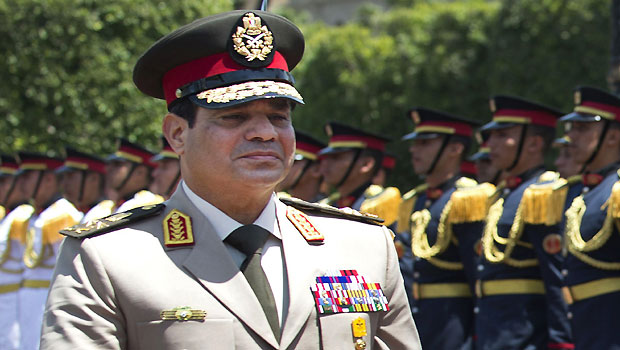There may be nothing new about Field Marshal Abdel-Fattah El-Sisi’s remarks in a recent interview, during which he said that the economic situation in Egypt is dire. That is pretty much to be expected after three years of political crises that have damaged key economic sectors, which really needed to grow by 7 percent annually in order to keep the economy on track. What is new, however, is that Sisi admitted these problems cannot be resolved quickly, and that it may require one or two generations of sacrifice for the third generation and their descendants to have a better life. As he acknowledged, no one individual can singlehandedly solve all a country’s problems.
This sense of realism is exactly what Egypt’s political discourse needs going forward, particularly after the presidential elections, expected to be contested and won by Sisi. In this new era, a new president will face major challenges that have been building up over decades of failed economic and social policies. Those were not realistic policies; instead, past leaders preferred putting off solutions to problems in fear of any confrontation—to the extent that they would procrastinate until the very last minute, until it was no longer possible to procrastinate.
Paradoxically, Egypt’s economic problems have been on the agenda for decades. Most politicians, economists and experts know exactly where the problems lie, and those problems have blocked the natural, genuine and sustainable growth needed to unleash the power of the economy. The most prominent problem is subsidies, which have expanded over time and which now take up a big chunk of the state’s resources. All economists know that when a product or service is offered below market value, it paves the way for waste, exploitation and corruption. Often the subsidized goods fail to reach their target demographic.
In the early 1970s, there was an attempt to reduce subsidies. This lead to the so-called bread riots during the era of the late President Anwar Sadat, who eventually had to roll back his program. All Egyptian governments that have followed had this nightmare to contend with, and dealt with it in fits and starts. On some occasions, they even depended on subsidies as a quick fix, which only exacerbated the inherent problems. This cure grew more and more painful to society as both population and prices, especially in the energy sector, increased. No government yet has found enough resources to fund some of the more crucial sectors, such as education and healthcare, because subsidies were and are eating up the largest chunk of the budget. Even when revenues, say from tourism and foreign investment, increased, governments preferred to avoid political confrontation over subsidies, as the favorable economic conditions allowed them to delay. This merely delayed the treatment of structural economic problems.
The mistake that led to the bread riots by the Egyptian government at the time was not that it decided to reduce subsidies at the request of the IMF to help address the country’s budget deficit. Had they been successful, the government that followed Sadat’s would have found it easier to carry out deeper economic reforms, particularly during the 1990s, when conditions were favorable and debts were cleared as foreign investment poured in. Regional conditions were also favorable at that time, as well as a political climate promoting investment.
The mistake was that those decisions were taken suddenly and without an effort to explain the program and its benefits to the public, which of course will suffer the brunt of efforts to scale back on subsidies, as well as the corresponding price hikes. There was no clear attempt to explain any of the measures taken to mitigate the effects on the poorest in society, who could not withstand the burden of higher prices.
Like its predecessors, the next government will face the subsidies issue and the need to enact reforms, as well as the need to address the public regarding these tough decisions. The major difference this time is that the next government will not have the luxury of procrastination, and the economic situation is far worse than ever following three years of crisis and recession. The new government will also have to enact these reforms in the face of a politically mobilized street that, at times, holds unrealistic expectations.
Getting through the hardest part is like swallowing a bitter pill in order to reap the benefits. This is not impossible, so long as there are creative ideas for implementing these reforms that save Egypt’s poorest from bearing the brute force of change. There are many ideas that have been silenced, many studies collecting dust, waiting for someone with the political will to hear them and take action. It would be easier if there were a popular political leadership that enjoyed the trust of the public, when they have to go before the Egyptian people and ask them to offer sacrifices in order to secure a better future.
